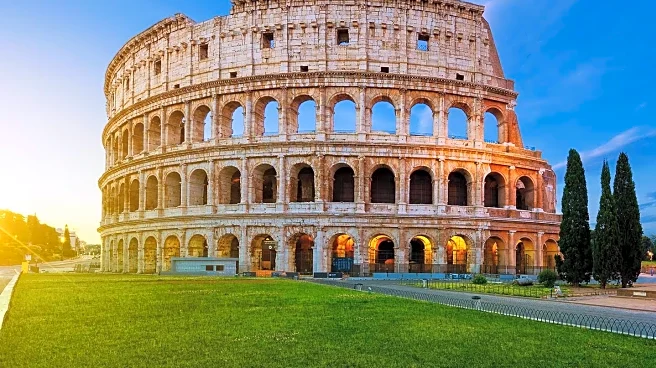What's Happening?
Simone Quilici, the new director of Rome's Colosseum, has clarified that the ancient amphitheater will not host electronic dance music parties, contrary to rumors circulating on social media. Quilici plans
to bring concerts to the Colosseum, emphasizing that they must respect the site's cultural and religious significance. He envisions acoustic or jazz performances, poetry readings, and historical reenactments, rather than large-scale raves. The Colosseum, a key tourist attraction, is already at maximum capacity, and Quilici aims to enrich the visitor experience with artistic events while encouraging tourists to explore other nearby historical sites.
Why It's Important?
The Colosseum is a symbol of Roman identity and cultural heritage, attracting millions of visitors annually. Quilici's plans to introduce concerts and performances aim to enhance the cultural value of the site, making it a place for artistic enjoyment rather than just a tourist destination. By promoting less-visited areas like the Roman Forum and Palatine Hill, Quilici hopes to manage tourist crowds and preserve the integrity of the Colosseum. His approach reflects a broader effort to balance tourism with cultural preservation in Rome.
What's Next?
Concerts and performances at the Colosseum are expected to begin in no less than two years, with careful planning to ensure they align with the site's historical significance. Quilici is working on creating new access points and connections between archaeological sites to better manage visitor flow. His tenure will focus on promoting cultural activities and encouraging tourists to explore lesser-known areas, potentially reducing the pressure on the Colosseum and enhancing the overall visitor experience.
Beyond the Headlines
Quilici's approach highlights the challenges of managing tourism in historical sites, where commercial interests often clash with cultural preservation. His emphasis on subdued music and historical accuracy in reenactments reflects a commitment to maintaining the Colosseum's dignity. The initiative to promote nearby sites could lead to a more sustainable tourism model in Rome, preserving its rich heritage for future generations.










